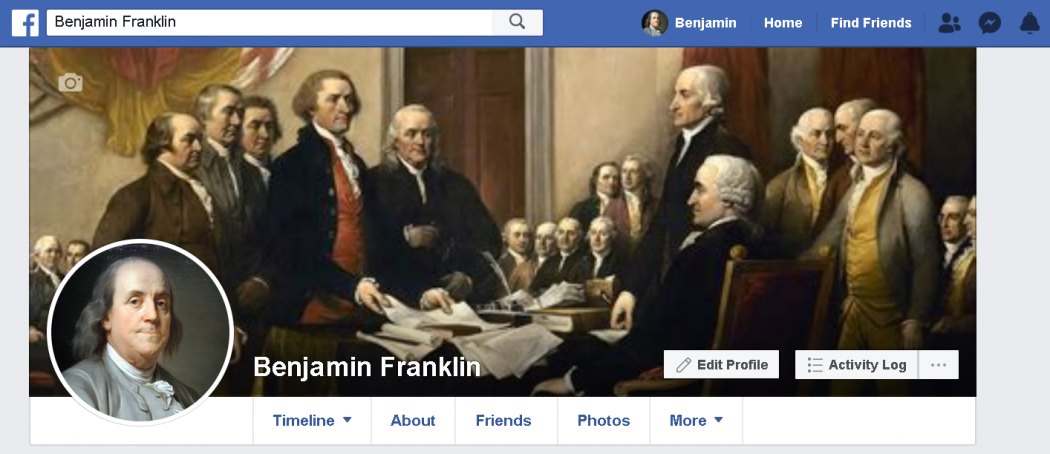The 1700s in America were a time of creative destruction and construction. As pioneering colonies clung onto the eastern coast, frontiering westward and into new economic territory, the literary minds of New England began their literary declaration of independence.
This was a time of words. Pamphleteers and newsprinters swam through viscous political climates to inform, and ended up doing much more: uniting the colonies. The exchange of newspapers between colonies formalized the reprints of important texts. By the 1760s, the colonial newspaper network developed into a powerful, open, and social platform for rehearsing arguments, propagating ideas, and exchanging opinions. News shared among colonies contributed to their vitality and unity.
Among this nation-founding activity was Benjamin Franklin, still a young man, digging his own footholds into this new chapter in American mythology.
When Franklin was 15, his brother James founded the New-England Courant, the first independent newspaper in the colonies. Concerned with his little brother’s newsprinting and not his writing, James denied Benjamin the chance to contribute letters to the publication he worked for. He adopted the pseudonym “Silence Dogood,” a middle-aged widow whose published letters became the town gossip. James was enraged by the discovery that Benjamin was Mrs. Dogood and consequently, Franklin fled to Philadelphia. Eight years later, he became publisher of The Pennsylvania Gazette.
Four years later, Franklin published the infamous “Poor Richard’s Almanack,” known for its witty, epigrammatic adages as guidance for a good life. The almanac, like many of his works, was written under a pseudonym: Richard Saunders.
The communal frameworks of Instagram and Facebook have Franklin’s name on them. In this way, Franklin and Zuckerberg are alike, just a couple hundred years apart.
Franklin is often named “The First American,” and for good reason. Beyond his many inventions and contributions to society, he was industrious. He possessed a sort of ruthless indefatigability that brought forth valuable connections, potent changes to American society, and a platform of social media. His culture-defining work as a newsprinter and author, among many other professions, shows that Franklin is the progenitor of social media.
A western contemporary enthusiasm for social media echoes the popularity of the original social media platform: the one created by The First American. The communal frameworks of Instagram and Facebook have Franklin’s name on them. In this way, Franklin and Zuckerberg are alike, just a couple hundred years apart.
Franklin’s role in the paper-based social media of his generation is reminiscent of the app-based social media of our own. There are surface level linkages, like the likeness of pseudonyms to anonymous usernames or the similar concision and wit of aphorisms and tweets. Perhaps his famous Junto, a club for philosophical and political debate, can be compared to today’s online communities. His “Join or Die” political cartoon to unify the colonies was the viral trend of the era.
Then, there are more crucial similarities such as the development of an inter-colonial newspaper network that provided an open platform for discussion and opinion, much like the online platforms of today. Of course, Franklin was a progressive in this realm as well.
Five years after his success with “Poor Richard’s Almanack,” Franklin was appointed postmaster of Philadelphia, and would eventually become the first United States Postmaster General. Throughout his career as a postmaster, he established the first post office to provide regular delivery, reorganized the accounting system, and streamlined the delivery services by transporting mail both day and night. These innovations earned the colonial post office’s first profit.
Franklin helped build the system and benefited from it; simply put, Franklin went viral.
The improved postal system was instrumental to the socio-literary platform of New England. Reprints of important documents could be sent across colonial borders. The speed of distribution and consumption of information revolutionized communication and surpassed geographical and social boundaries. Franklin helped build the system and benefited from it; simply put, Franklin went viral.
Benjamin Franklin is the pinnacle of the American Dream. He is the very concept of the pull-yourself-up-by-your-own-bootstraps self-making that his descendants strive for. However, there is a link between Franklin’s industriousness and the behaviours in contemporary social media today.
Franklin was a remarkable salesman. He possessed a public self-consciousness and saw himself as an entity in social settings, and was able to market himself to people he desired connections with. In an interview with McGill professor Peter Gibian who teaches American literature, he described Franklin as a “personality that is so public facing.”
Franklin was not simply extraverted and charismatic. He was an actor and his audience (often literally an audience in a coffee house debate) would perceive him based on his observed behaviour. Except, Franklin closely controlled his expressions to mediate the way others perceived him. As he wrote in his autobiography, “I took care not only to be in reality industrious and frugal, but to avoid all appearances to the contrary.” Attached to his public relations was an air of theatricality; he dressed ‘plainly’ to appear modest and avoided being seen idle to always appear busy. The stage continued into his private life; he’d sit by his window in plain view with his back turned and his book propped up to show what he was reading.
If Franklin was a Youtube vlogger, filming and editing the parts of his life worth showing (and he’d probably do just that), he might be accused of his fabrications and embellishments. However, a vlogger, letting their audiences into their perfect, edited lives is really the 21st century equivalent to Franklin’s theatricalities. Both Franklin and the vlogger convert their private sphere into their public sphere. In fact, Franklin’s intended audience in his three part autobiography corresponds to this shift: part one to his son, part two to the youth, and part three for everyone.
Benjamin Franklin lived in an era of words. Pamphlets were, as Gibian described, “a derivative of newspapers.” Perhaps tweets are derivatives of aphorism. Perhaps pseudonyms are the 18th century username. Yet as much as he was a man of letters, the platform he built has made us, the beneficiaries of his creation, men and women of letters in our own right.
“Sleep does not help if it is the soul that is tired.”
A Franklinian quip, written by @itsfrankocean on his Instagram bio.








